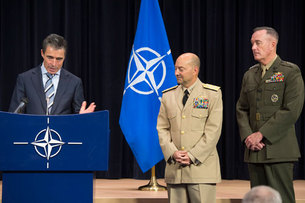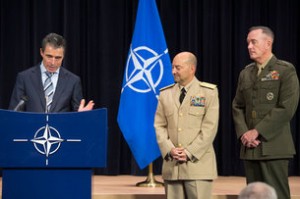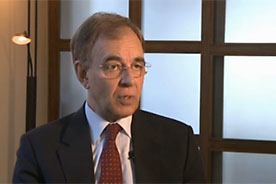

BRUSSELS – General Joseph Dunford has assumed command of ISAF. Secretary General Rasmussen stated “I wish him every success and I look forward to working closely with him.
“General Dunford is taking command as we are preparing to reach an important milestone in our mission,” added the Secretary General. “In a matter of months, Afghan forces will be in the lead for security across the country, and ISAF will shift its main effort from combat to support”.
General Joseph Dunford has NATO’s Confidence
“I am confident that General Dunford will lead ISAF through this transition with great skill and determination. He has our full support,” continued Rasmussen. “I also thank General John Allen for the tremendous contribution he has made to our mission in Afghanistan”.
General Allen took command of ISAF at a pivotal moment, as the process of transition to Afghan security lead was beginning. During his time in command, transition gained an irreversible momentum, with Afghan soldiers and police assuming responsibility for the security of almost 90% of the Afghan people. General Allen has demonstrated outstanding leadership. Once confirmed by the United States Senate, I am sure that he will bring the same commitment to the role of Supreme Allied Commander in Europe.
Afghanistan in Transition

Progress in Afghanistan will not just depend on security. NATO’s Senior Civilian Representative in the country, Ambassador Maurits Jochems, says he recognises the fear many Afghans express that they are being abandoned. But he stresses that long-term commitment from the international community will remain past the 2014 mark.
The transition period really means that the Afghan political leaders, Afghans in general are in the lead in their own country. That’s how it should be, so in that sense, the international community has to let go. That said, Afghanistan still needs support,” he told the NATO Channel in a recent interview.
Ambassador Jochems is no stranger to Afghanistan. He previously served as NATO’s interim Senior Civilian Representative in Afghanistan in 2008, which, like this year, was the prelude to presidential elections. He says the upcoming elections, in which current President Karzai cannot be re-elected, will be more important than the security transition.
“This is one of the litmus tests for the political transition. It’s really up to the Afghan leaders, both in the government, but also outside of the government, to give confidence to the Afghan population that the political transition will lead to a peaceful outcome.”
There is still more work to be done in terms of improving Afghans’ everyday lives, says Ambassador Jochems, but it’s important not to forget what’s been achieved in the last decade.
“There’s still a lot to be done in the government providing basic services. But that said, in the past ten years a lot has been accomplished. I mean, eight million students are now going to school, of which three million are girls. Health services are now accessible, I think, to 85 per cent of the population within an hour of where they live. So, all these are accomplishments, which we should not forget.”
Enduring support for Afghanistan also has a figure to back it up. Some 16 billion US dollars were pledged at the Tokyo conference for the four years following 2014. While there are conditions for that support, Ambassador Jochems says Afghanistan will never stand alone.
“In terms of governance, things like, for example, corruption should be tackled better. And also on the human rights score, for example, the position of women is being looked at by the international community as one of the conditions to be fulfilled by the Afghan government, post 2014. Afghanistan should be on its own, but not alone, as they say.”






